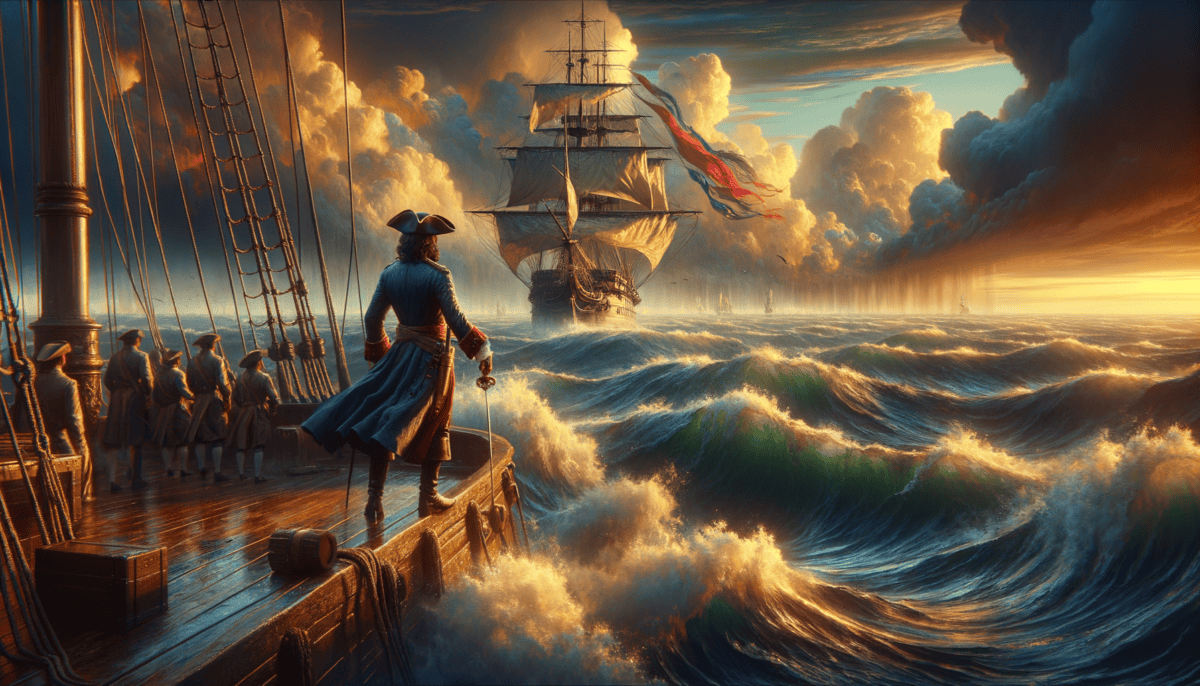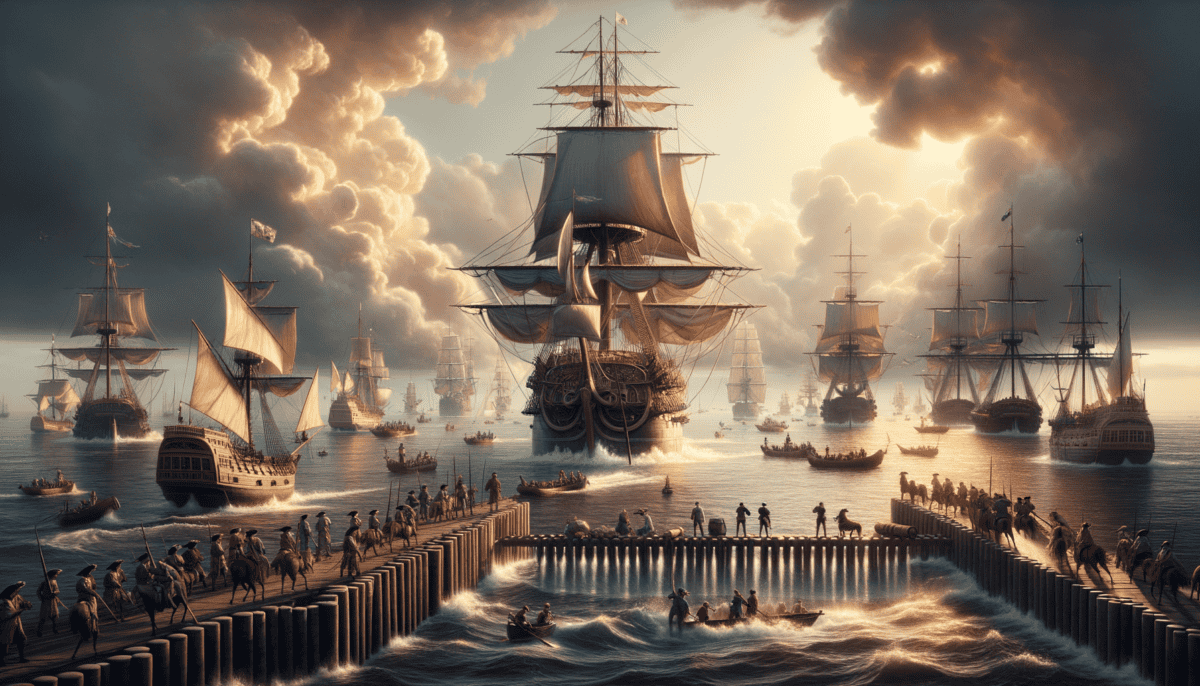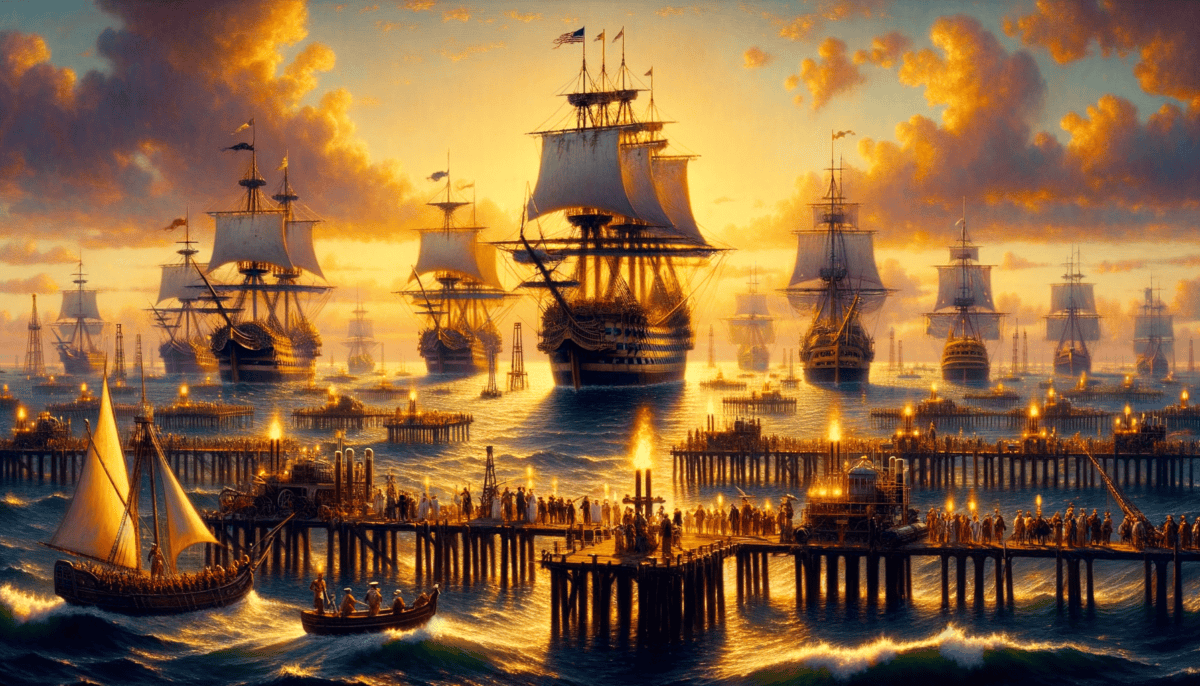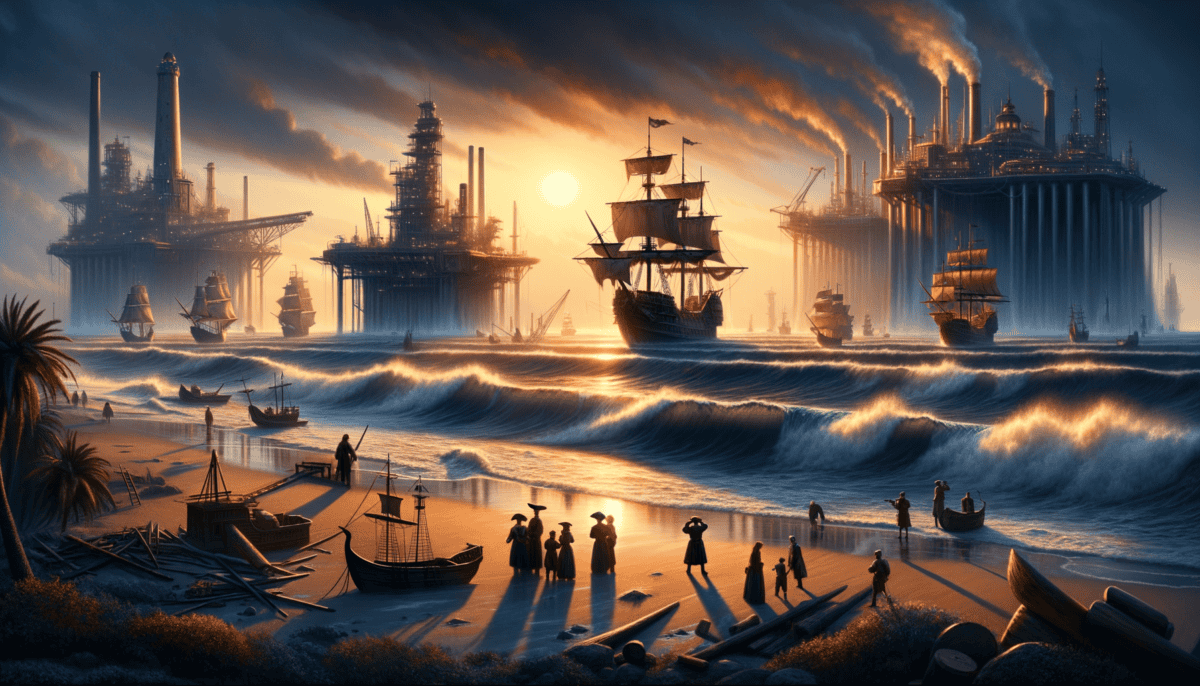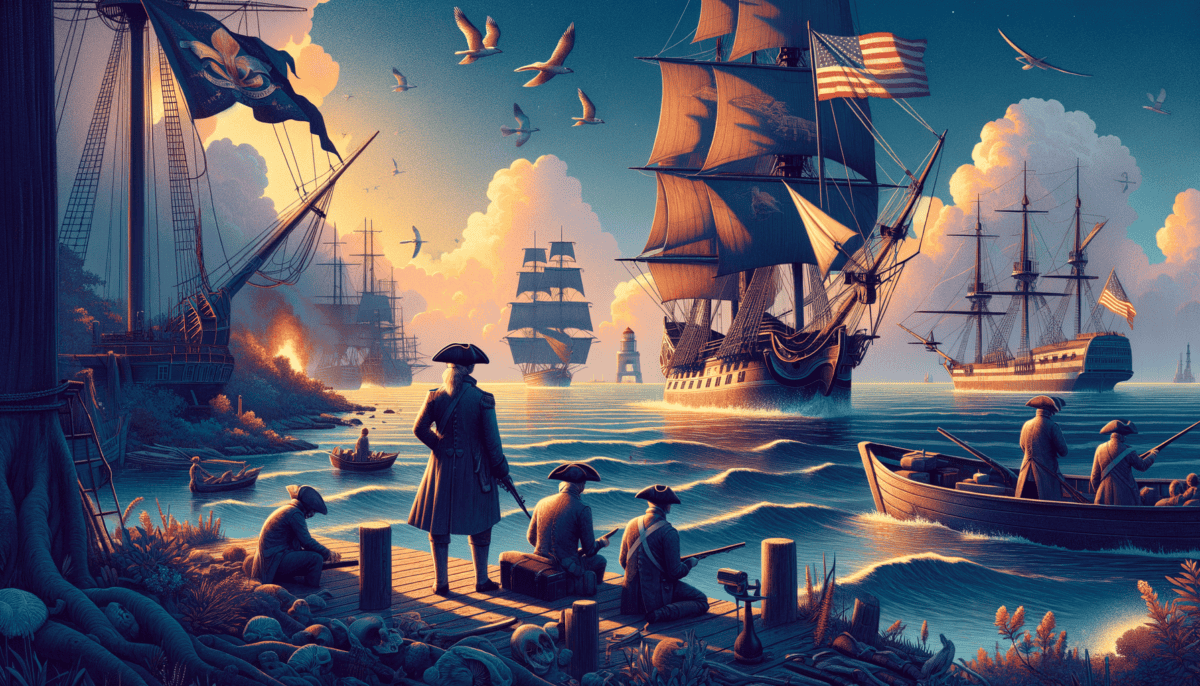Waves of Discovery
The big blue water stretched as far as the eye could see. Ponce de León stood at the bow of his ship, squinting into the bright sunshine. The year was 1513, and he was about to make history!
The warm breeze ruffled through his hair as seabirds swooped overhead. His crew members whispered excitedly behind him. They were the first Europeans to explore these mysterious waters that would one day be called the Gulf of Mexico.
"Land ho!" shouted the lookout from high up in the crow's nest.
Ponce de León smiled. After weeks at sea, they had finally reached the shore of a new land. But they weren't alone – people already lived here!
First Meetings
As their ship got closer to land, they saw small boats paddling out to meet them. In these canoes were Native Americans – the Calusa people. They had lived along these shores for thousands of years.
"Welcome, strangers!" called out one of the Calusa in their language, waving friendly greetings.
The Calusa were expert fishermen who built their homes on shells. They knew every fish, every current, and every secret of the Gulf waters.
The Spanish sailors were amazed by what they saw:
• Beautiful white sand beaches
• Clear blue-green water
• Tall palm trees swaying in the breeze
• Colorful birds flying overhead
• Fish jumping out of the water
Making Maps
Ponce de León and his crew spent many days exploring the coastline. They drew careful maps of everything they saw. They gave names to new places and wrote down what they found.
"Look at all the flowers!" said one sailor, pointing to the colorful plants on shore. That's why Ponce de León named the land "Florida" – which means "flowery" in Spanish.
New Friends and New Foods
The Calusa showed the Spanish explorers many wonderful things:
- How to catch the biggest fish
- Which fruits were good to eat
- Where to find fresh water
- How to stay safe from storms
"Try this!" said a Calusa fisher, offering them some fresh seafood. The sailors had never tasted such delicious fish before!
But not everything was perfect. Sometimes there were misunderstandings between the Spanish and the Calusa. They spoke different languages and had different ways of doing things.
Big Changes
As more Spanish ships arrived, life began to change along the Gulf coast. The Spanish built forts and churches. They started new towns. More and more European ships sailed these waters.
"We must tell the King about this wonderful place," Ponce de León wrote in his journal. He knew these waters would become very important.
The Gulf became like a big highway on the sea. Ships carried people and things between Spain and the new lands they found. It was the beginning of big changes for everyone who lived near these special waters.
Young Pedro, the cabin boy, watched all this with wide eyes. "What else will we find in these waters?" he asked Ponce de León.
The explorer patted the boy's shoulder. "My young friend," he said with a smile, "this is just the beginning of many adventures in the Gulf of America!"
Pirates and Patriots
☠️ The moon cast a silver light over the dark waters of the Gulf. Jean Lafitte stood at the wheel of his ship, his eyes scanning the horizon. He wasn’t just any sailor – he was a pirate, but a very special kind of pirate!
A Different Kind of Pirate
“Captain Lafitte!” called out his lookout. “There’s a ship ahead!”
But Jean wasn’t interested in attacking just any ship. He had a code – he only went after ships from countries that were mean to America. He helped regular people by selling them things they needed at fair prices.
“I may be a pirate,” Jean would say, “but I’m a pirate with a heart!”
The Big Battle
In 1814, something big happened. The British were coming to attack New Orleans! General Andrew Jackson needed help to protect the city.
“Will you help us defend New Orleans?” General Jackson asked Jean.
“Of course!” Jean replied. “This is my home too!”
Friends in Strange Places
The pirates worked with the American soldiers to get ready for battle. They taught them about:
- The best hiding spots in the swamps
- How to move quietly through the water
- Where the British ships might try to sneak in
- The safest places to put their big guns
- How to use the tide to their advantage
The Big Day
“Here they come!” shouted a watchman one morning. The British ships were trying to enter the Gulf!
Jean and his pirates helped the American soldiers fight bravely. They knew every bend in the river and every hidden sandbar. This helped them surprise the British ships.
“We did it!” cheered the soldiers and pirates together when they won. The Battle of New Orleans was a big victory!
A New Beginning
After helping save New Orleans, Jean wasn’t seen as just a pirate anymore. He was a hero! The Gulf waters had seen him change from an outlaw to a patriot.
“The Gulf is changing,” Jean told his crew. “It’s becoming a place where all kinds of people work together.”
As Jean sailed away into the sunset, he knew the Gulf would keep changing. More ships would come, carrying new people and new dreams. But the spirit of working together that he helped create would stay forever.
The moon rose over the Gulf waters once again, lighting the way for all the adventures yet to come. The age of pirates was ending, but an even more exciting time was about to begin! ⚓
Civil War Tides
The sun rose over the busy port of New Orleans. Ships filled with cotton waited to leave. Other ships bringing food and supplies wanted to come in. But something was wrong. Big Union ships blocked the way!
The Blockade Begins
Sarah watched from her window as worried sailors rushed around the docks. Her father was a ship captain who carried cotton to other countries.
“Papa, why can’t the ships leave?” Sarah asked.
“The Union Navy has made a wall of ships,” her father explained. “They don’t want us to trade with anyone.”
“It’s like a giant fence made of ships, stretching across the water.”
Brave Runners
Some captains became very clever. They painted their ships gray like the fog. They turned off their lights at night. These brave sailors were called “blockade runners.”
“Look how fast that ship moves!” whispered Tommy, a young dock worker. “It’s like a ghost on the water!”
Life on the Waters
Union sailor Billy Thompson wrote in his diary about life on the blockade:
“The water is always moving. We watch day and night for ships trying to sneak past. Sometimes big storms come, and the waves get very high. But we stay at our post.”
Fighting on the Water
New kinds of ships appeared in the Gulf. The Confederates built special boats called ironclads. They were covered in metal to protect them from cannon balls.
“It looks like a giant turtle!” said one sailor when he saw an ironclad for the first time.
The Union had iron ships too. When these ships fought, it sounded like thunder on the water! ⚡
Heroes of the Gulf
Many brave people helped others during this hard time. Here are some ways they helped:
- Fishermen shared their catch with hungry families
- Lighthouse keepers warned ships about dangers
- Nurses took care of hurt sailors
- Regular people helped hide food and medicine
- Children carried messages between ships
Changes in the Gulf
The Civil War changed life on the Gulf forever. Big steam-powered ships replaced sailing ships. New ports grew bigger. People learned new ways to work together.
As the war ended, the blockade ships sailed away. The Gulf ports opened again. Ships could come and go freely. But the stories of bravery and cleverness would be told for many years.
Sarah watched the ships return to the harbor. “The Gulf will always be here,” she said, “helping us connect with the whole world.”
Oil and Opportunity
Little Jimmy stared at the strange sight from the beach. A tall tower rose from the water! “What is that, Grandpa?” he asked, pointing at the offshore platform. ️
Grandpa smiled and sat down in the sand. “That’s where we get oil from under the sea. It’s like a giant straw drinking milkshake from the bottom of the ocean!”
The First Big Find
“It all started at Spindletop,” Grandpa explained. “The ground burst open like a fountain, shooting oil high into the sky! People called it a gusher.”
“Was it scary?” Jimmy asked.
“Very exciting! The whole town of Beaumont, Texas changed overnight. People came from everywhere to work in the oil fields.”
“Black gold fever spread faster than wildfire along the Gulf Coast!”
Moving to the Water
As years passed, clever engineers had a bold idea. “What if we could find oil under the ocean?” They built special platforms to drill in the water.
“The first offshore rig looked like a tiny house on stilts in the water. Now they’re as big as buildings!”
New Jobs, New Lives
The oil business brought lots of changes to the Gulf Coast:
- New towns grew bigger
- People got good jobs
- Schools taught special oil classes
- Boats became working vessels
- Factories made drilling equipment
Keeping the Gulf Clean
Maria, an environmental scientist, visited Jimmy’s class. She showed pictures of pelicans and dolphins.
“We must take care of our ocean friends,” she said. “When we drill for oil, we have to be very careful.”
The children learned about special rules:
“We use strong pipes that don’t leak. We watch the water every day. We clean up any tiny spills right away.”
Smart New Ideas
Tommy’s mom worked on an oil platform. She told exciting stories about new technology:
“We have underwater robots that check the pipes. They look like little submarines with arms!”
“Can I drive one someday?” Tommy asked.
“Maybe! We’re always looking for smart people who want to help find new ways to get oil safely.”
Looking to Tomorrow
Back on the beach, Jimmy built a sandcastle near the water. He could see several platforms far away.
“Grandpa, will we always need oil?”
“Well, Jimmy, we’re learning to use other kinds of energy too. The Gulf might look different when you’re my age. But it will always be special.”
As the sun set, Jimmy watched boats heading out to the platforms. The lights started twinkling like stars on the water. The Gulf had more stories to tell, and he couldn’t wait to hear them. ⭐
When Nature Shows Its Power
Sarah watched the dark clouds gather over the Gulf. The wind was getting stronger. ️
“Mom, is that a hurricane coming?” Sarah asked, clutching her favorite stuffed dolphin.
“Yes, sweetie. But don’t worry – we know what to do,” Mom said, checking their emergency kit.
The Big Storm
The radio crackled with news about Hurricane Katrina. It was heading straight for New Orleans. People packed their cars and drove away from the coast.
“Sometimes the bravest thing to do is leave your home to stay safe.”
Sarah’s friend Marcus lived in New Orleans. His family stayed with Sarah’s family during the storm.
“The water came up so high in our city,” Marcus said. “It was like a giant bathtub overflowing.”
Heroes in Action
Many brave people helped during Hurricane Katrina:
- Rescue boat drivers saved families
- Doctors helped sick people
- Neighbors shared food and water
- Kids made welcome cards
- Pet rescuers saved animals
Building Back Better
After the storm, people came together to fix their towns. They made stronger houses and better walls to stop flooding.
Nature’s Warning Signs
Ms. Rodriguez, the science teacher, taught her class about hurricanes:
“The Gulf’s warm water helps make storms stronger. We must watch the weather carefully.”
“When animals act strange or the air feels different, a storm might be coming. Nature gives us clues!”
Helping Each Other
Sarah’s class wrote letters to kids in other Gulf towns hit by storms.
“Dear friend,” Sarah wrote, “We are thinking about you. Stay strong! Would you like some of my books?”
Marcus’s family finally went home to New Orleans. Their house needed lots of work, but neighbors helped paint and fix things.
Ready for Anything
Now Sarah’s family has a special storm box. Inside are:
Flashlights, batteries, water bottles, snack bars, and a radio that works without plugging in!
A Stronger Gulf Coast
Today, the Gulf Coast is stronger than ever. Scientists created better ways to spot storms. Buildings are tougher. People know more about staying safe.
Sarah looked at the sunset over the Gulf. The clouds were gone now. She knew that even when big storms came, her community would stand together. That made her feel brave and strong.
Protecting Our Gulf
The sun sparkled on the Gulf waters as Sarah and Marcus walked along the beach. It was hard to believe this was the same ocean that could bring big storms.
“Look!” Sarah pointed at some workers in bright orange vests cleaning the beach. “They’re helping keep our Gulf clean!”
The Big Spill
Ms. Rodriguez showed her class pictures of the Deepwater Horizon oil spill. Black oil had spread through the beautiful blue water.
“It was like someone spilled a giant bottle of motor oil in the ocean,” she explained. “But people worked very hard to clean it up.”
Ocean Heroes
“Everyone can be an ocean hero,” Sarah’s mom said. “Even small actions make a big difference.”
Sarah and Marcus started a beach cleanup club at school. They invited their friends to help:
- Pick up trash on the beach
- Recycle plastic bottles
- Learn about sea animals
- Tell others how to help
- Plant sea grass to stop beaches from washing away
New Ways to Help
Scientists created special robots to check on the Gulf’s health. These underwater helpers can:
Measure water temperature ️
Take pictures of fish
Find places that need cleaning
Watch for oil spills
Working Together
“The Gulf connects us all,” Marcus said during his class presentation. “What happens in one place affects everyone.”
Hope for Tomorrow
Sarah drew a picture of how she wanted the Gulf to look in the future:
Clean beaches with white sand ️
Clear blue water full of fish
Happy dolphins jumping in waves
Green plants growing in wetlands
The Gulf’s Future
New rules help protect the Gulf. Oil companies must be more careful. Ships must follow special paths to avoid hurting whales. Fishing boats must let young fish grow up.
As the sun set, Sarah and Marcus watched pelicans dive for fish. The Gulf was healing. With everyone working together, it would stay beautiful for years to come.
“We’re Gulf guardians now,” Sarah smiled, picking up a piece of trash. “And we’ll never stop caring for our special sea.”
Marcus nodded, writing in his nature journal. “The Gulf has given us so much – history, food, fun, and home. Now it’s our turn to give back.”
Their story, like the Gulf itself, would continue flowing forward, carried on waves of hope and determination. The greatest chapter was still being written – by people like Sarah and Marcus who loved their Gulf of America.


